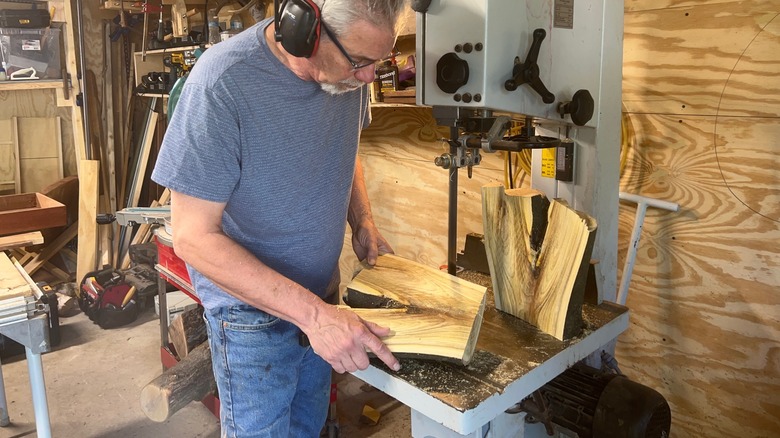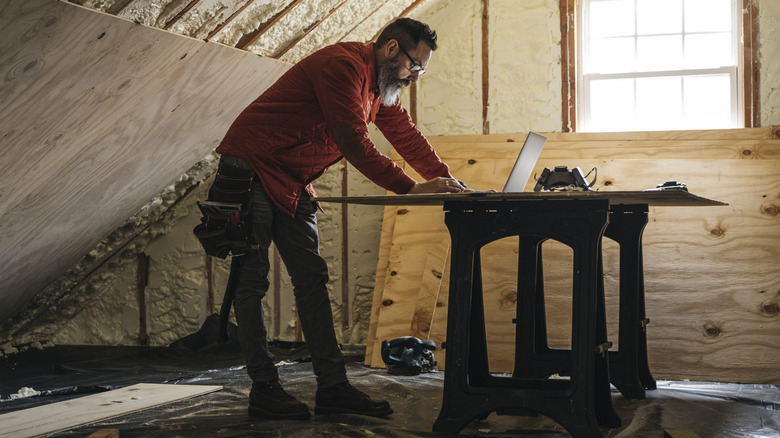The Internet Is Full Of Bad Woodworking Advice: Here's How To Do Better Research
As an expert woodworker with decades of experience, looking for woodworking instructions on the internet (be it video or written content) is just something I don't have to do. In fact, I've helped create instructional woodworking content. But with topics of which I am ignorant, like plumbing basics, how to catch a tuna, how to lay brick, or how to play the mandolin, I look it up online just like everyone else. I refer to YouTube as the source of all knowledge. But there I confront the problem all of us have when it comes to gathering information: whether it's correct. Can I trust it? I can't know what I don't know. If a YouTuber tells me that all I need to plumb my new shower is ½-inch PVC pipe, can I trust them or might a ¾-inch copper pipe be a better solution? You get the drift.
Luckily, woodworking is not rocket science, but there are correct ways to do things and ways that might work but are less than optimal. This is complicated by the fact that woodworking is a skill that has been around for centuries and there's often more than one way to complete a task. So, you might check out two videos teaching how to do something like making a mortise and tenon (a way to join two pieces of wood together) and get two very different sets of instructions ... and both could be "right." This is not unique to woodworking. Think of how many options there are for every kind of egg recipe and all of them work. For woodworking, here's how to research.
Verify the teacher's credentials
The first thing to do whether you are reading an article or viewing a video is to stop and do an internet search for the author or influencer. In fact, you can do it right now. Go ahead and search for Rob Johnstone + woodworker in a separate tab. You'll get a bunch of results showing that I have been making content on DIY woodworking for beginners for a long time. That should give you some confidence in my advice.
Second, you can Google who I am writing for: what is hunker.com? You'll see that Hunker is a legitimate website. That should give you even more confidence. Longevity is another clue. How long have they been an expert in the field? I started a successful woodworking-based newsletter on the web back in 2000 back when most people still used dial-up connections and it took minutes to download an image. While younger or less experienced woodworkers may be equally educated, longevity is going to indicate if the site or channel is delivering quality.
Another test is to look at what the site or instructor claims. Are they an influencer presenting themselves as a source of deep knowledge, or as beginners sharing their journey? Both have value as long you understand that one is more authoritative, and the other is sharing knowledge as they learn it. I know several YouTube woodworkers who started out as rookies, sharing their successes and failures, and now are excellent craftspeople. Wisdom is knowledge plus experience. The danger is people presenting themselves as authoritative because they learned some stuff, but lack the experience to refine their instruction.
Read the feedback from online videos and articles
I hesitate to put too much stock in online comments. As someone who has published on the web via print and video for scores of years, I have found that sometimes, someone will call you a moron and find fault in the comments ... even with perfectly legitimate content. What do the preponderance of comments and questions indicate? And when it comes to questions, does the influencer answer them? A content creator who takes the time to answer questions and clarify the instruction is much more likely to be presenting quality information than those who don't. But do take a moment to evaluate the question as well as the answer. It's perfectly fine to question a premise, but is it in context? Consider a commenter on a recipe blog: did they actually follow the recipe, or did they make substitutions and now they're unhappy with the result?
One key to identifying quality content is if you find where an error has been made and then corrected. Again, as a professional woodworker who has published hundreds of articles and woodworking plans, I have published mistakes. It will happen. And when an error is published, a correction is due. Every quality publication, be it a newspaper to a how-to woodworking website or gossip site, will have a method to correct mistakes. It is a valuable service to those using the instruction. With this statement comes a caveat — some "instructional" channels or websites are actually focused on entertaining you than really teaching you how to do something. Look out for that.
Red flags to look out for and sure bets for advice
In addition to those sites that more "entertainment" than "educational," there are other things to look for. If an influencer is making extreme statements or claiming to have knowledge that is uniquely their own or secret, that is a red flag. The saying that there is nothing new under the sun is especially true of woodworking. If a website wants money before it will teach you anything, another red flag. While it may seem obvious, if someone is trying to sell you a product, their information is likely skewed to present that product as an answer to a woodworking problem.
These days AI-created videos are common. Listen for mispronounced words, and cadence and tone that seem odd. Also, quick or overly long cuts between scenes and things spelled wrong or being complete gibberish in the background. AI created written content is harder to spot. There are AI apps that can be effective in spotting AI text. AI still images are hard to spot as well, but look for correct number of fingers and text spelled incorrectly in the background.
Finally, and this goes along with verifying your instructors, looking for your information from well-established organizations. How-to magazines often create instructional videos in their specialty, like Fine Woodworking for woodworking or Popular Science for science-related topics. While it's true that there are many individuals on the web who are producing good quality woodworking instruction as a novice, telling them apart from the less-qualified folks can be hard. If a well-known publication promotes a teacher and their content, be assured it won't lead you astray.



